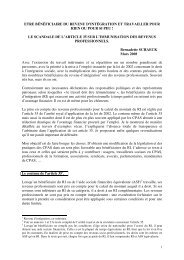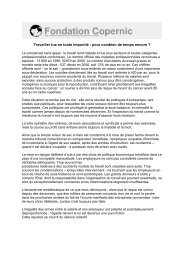Awra Amba RJ 300612 EN - Contacter un comité local d'Attac
Awra Amba RJ 300612 EN - Contacter un comité local d'Attac
Awra Amba RJ 300612 EN - Contacter un comité local d'Attac
You also want an ePaper? Increase the reach of your titles
YUMPU automatically turns print PDFs into web optimized ePapers that Google loves.
<strong>Awra</strong> <strong>Amba</strong>, a current experiment of utopian socialism<br />
4.5.2. Fortnightly family meeting<br />
The evening meal taken with the family is an opport<strong>un</strong>ity to discuss together problems enco<strong>un</strong>tered.<br />
Each member of the family has his own day to address his personal questions and discuss his<br />
problems (Crespo, 2011).<br />
Family meetings (or family members' conferences) are held moreover every two weeks at the same<br />
time in all households. During one hour, all activities stop, except spinning cotton and clearing<br />
cottonseed. This hour is devoted exclusively to the children, which makes of these family meetings a<br />
key element of the education of children. It gives for instance the opport<strong>un</strong>ity to discuss with a child<br />
who quarrelled with another child or who disobeyed a comm<strong>un</strong>ity rule like the absolute ban to lie or<br />
steal, what shall have been reported to his parents (At05/89).<br />
These family meetings are internal within each family and should not be mistaken for family<br />
conferences, which get several families together and are rather exceptional (see section 4.7)<br />
(Question 28 in Annex).<br />
4.5.3. Solidarity between generations<br />
New mothers get three months maternity leave (one month before delivery, two months after)<br />
(Jo10b/6). After the birth, a lamb can be killed for her by her husband and if it is not possible by the<br />
comm<strong>un</strong>ity, and she will be helped by two women for one month (awraamba, nd).<br />
Later, a member of the comm<strong>un</strong>ity looks after the welfare of all the yo<strong>un</strong>g children whose parents<br />
are working (Mamo, 2006).<br />
If the parents die, the orphan is taken care of by the comm<strong>un</strong>ity <strong>un</strong>til he reaches the age of 18, then is<br />
free to stay or leave (Crespo, 2011).<br />
The sick are treated in a small infirmary the comm<strong>un</strong>ity completed in 2007, and in a new building<br />
built in 2009 by the State. The infirmary had in 2010 a full time male nurse, paid by the comm<strong>un</strong>ity<br />
and not born in the comm<strong>un</strong>ity. He lived in the village and was available 24 hours a day (Jo10b/6).<br />
In 2011, a nurse born in the comm<strong>un</strong>ity came every day, but lived in Woreta and was paid by Bahar<br />
Dar Region (Crespo, 2011); in 2012, this same nurse lives in the village and is paid by the<br />
cooperative (Crespo, 2012).<br />
The infirmary is open to everyone. It is equipped for antenatal care, birth control and the first aid<br />
(Jo10b/6) and has to be paid (Crespo, 2011).<br />
The elderly are traditionally treated with respect in the Amhara culture, within their extended family.<br />
But, for economic reasons, because of the destruction of the solidarity mechanism and the decline of<br />
the extended family, the elderly are increasingly vulnerable, the mosques and churches being<br />
sometimes the only ones to give them a shelter (Ya08/86).<br />
In <strong>Awra</strong> <strong>Amba</strong>, according to Yi07/53 and Me09/45, the elderly or the people with disabilities who<br />
are no longer able to work at all are not only respected, but the comm<strong>un</strong>ity takes on their expenditure<br />
in accordance with articles 5 and 6 of the comm<strong>un</strong>al status, because they are considered to have<br />
contributed through their work to the well-being not only of their family, but of the whole<br />
comm<strong>un</strong>ity. However, Atnafu (2005/40) states old dependent parents are always supported by their<br />
children and may choose with which one of their children they prefer to live, the comm<strong>un</strong>ity taking<br />
on the expenditure of the elderly without family (Question 29 in Annex).<br />
The elderly are housed in a separate building (Picture 13), where they are fed three times a day,<br />
washed (vol<strong>un</strong>teers give them three baths a week) and receive free medical care, 24 hours a day<br />
(Mamo, 2006; Halpern, 2007; Calvino, 2009). Each one pays to the comm<strong>un</strong>ity a fee for elderly<br />
(Crespo, 2011). "The elderly are everybody’s elderly, they are part of the family". At first a small<br />
building with two or three beds was reserved for their use. This was replaced by a new one with<br />
58 / 85

















